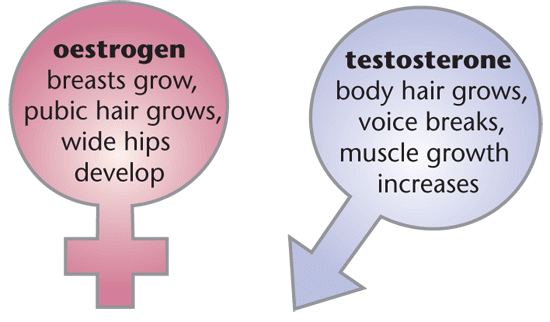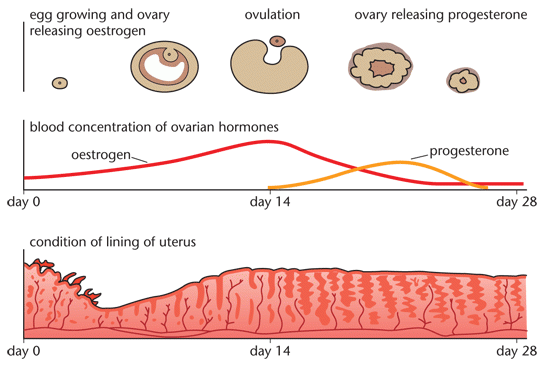Hormones (Uses in Reproduction)
Hormones and Reproduction


The reproductive hormones
Hormones are responsible for controlling many parts of the reproduction process.
This includes:
- the development of the sex organs
- the production of sex cells
- controlling pregnancy and birth.
Testosterone and oestrogen control the changes occurring in the male and female bodies at puberty. These changes are the secondary sexual characteristics.
The secondary sexual characteristics also include the production of the sex cells. In the male they are sperm and in females they are eggs.
After puberty, sperm are produced continuously but in the female one egg is usually released about once a month. This means that oestrogen and progesterone levels vary at different times in the monthly cycle.
Oestrogen levels are high in the first half of the cycle. The oestrogen prepares the wall of the uterus to receive a fertilised egg. It does this by making the wall thicker and increasing its supply of blood. It also triggers the release of an egg. This is called ovulation.
Progesterone is high in the second half of the cycle. It further repairs the wall of the uterus and stops it breaking down.
Hormones: Controlling Reproduction
The production of oestrogen and progesterone is controlled by the release of other hormones. These hormones are made in the pituitary gland in the brain.
It is now possible to produce synthetic versions of these hormones. They can be used to control the fertility of women. This can happen in two main ways:
Increasing fertility
Some women find it difficult to get pregnant because they do not produce eggs regularly. These women can take a fertility drug. This contains hormones that are similar to FSH. The drugs stimulate the production of eggs and sometimes a number of eggs are released each month. Sometimes women are treated with fertility drugs and the eggs are removed from their body. The eggs can then be fertilised by sperm outside the body. The embryo can then be put back inside the uterus. This process is called in vitro fertilisation or IVF. It can be used on women who have blocked oviducts.
Decreasing fertility
Other women may want to stop themselves becoming pregnant. They take drugs that are called oral contraceptives. These drugs contain hormones that prevent the pituitary gland releasing FSH. This means that the ovary will not produce eggs.

